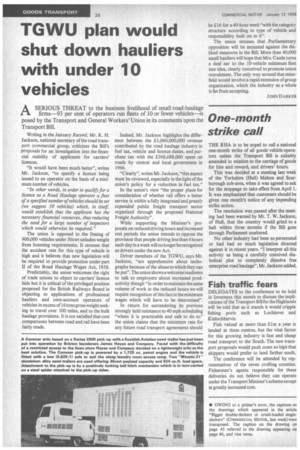TGWU plan would shut down hauliers with under 10 vehicles
Page 30

If you've noticed an error in this article please click here to report it so we can fix it.
ASERIOUS THREAT to the business livelihood of small road-haulage firms-93 per cent of operators run fleets of 10 or fewer vehicles—is posed by the Transport and General Workers' Union in its comments upon the Transport Bill.
Writing in the January Record, Mr. K. H. Jackson, national secretary of the road transport commercial group, criticizes the Bill's proposals for an investigation into the limncial stability of applicants for carriers' licences.
"It would have been much better", writes Mr. Jackson, "to specify a licence being issued to an operator on the basis of a minimum number of vehicles.
"In other words, in order to qualify for a licence as a Road Haulage operator a fleet of a specified number ofvehicles should be set (we suggest 10 vehicles) which, in itself, would establish that the applicant has the necessary financial resources, thus reducing the need for a large number of inspectors which would otherwise be required."
The union is opposed to the freeing of 900,000 vehicles under 30cwt unladen weight from licensing requirements. It stresses that the accident rate for this type of vehicle is high and it believes that new legislation will be required to provide protection under part II of the Road Haulage Wages Act, 1938.
Predictably, the union welcomes the right of trade unions to object to carriers' licence bids but it is critical of the privileged position proposed for the British Railways Board in objecting to applications of professional hauliers and own-account operators of vehicles in excess of 16 tons gross weight seeking to travel over 100 miles, and to the bulk haulage provisions. It is not satisfied that cost comparisons between road and rail have been fairly made. Indeed, Mr. Jackson highlights the difference between the £1,060,000,000 revenue contributed by the road haulage industry in fuel tax, vehicle and licence duties, and purchase tax with the £368,688,000 spent on roads by central and local government in 1966.
"Clearly", writes Mr. Jackson, "this aspect must be reviewed, especially in the light of the union's policy for a reduction in fuel tax."
In the union's view "the proper place for consideration of whether rail offers a better service is within a fully integrated and greatly expanded public freight transport sector organized through the proposed National Freight Authority".
While supporting the Minister's proposals on reduced driving hours and increased rest periods the union intends to oppose the provision that people driving less than 4 hours each day in a week will no longer be recognized as drivers under the new Act.
Driver members of the TGWU, says Mr. Jackson, "are apprehensive about tachographs because of the abuse to which they can be put". The union shows a welcome readiness to talk to employers about increased productivity though "in order to maintain the same volume of work in the reduced hours we will require recognition of this fact in the minimum wages which will have to be determined".
In return for surrendering its previous strongly held resistance to 40 mph scheduling "where it is practicable and safe to do so" the union claims that the minimum rate for any future road transport agreements should be 16 for a 40-hour week "with the category structure according to type of vehicle and responsibility built on to it".
The union stresses that Parliamentary opposition will be mounted against the disliked measures in the Bill. More than 40,000 small hauliers will hope thatMrs. Castle turns a deaf ear to the 10-vehicle minimum fleet size idea, clearly conceived to promote union recruitment. The only way around that minefield would involve a rapid extension of group organization, which the industry as a whole is far from accepting.
JOHN DARKER
















































































































